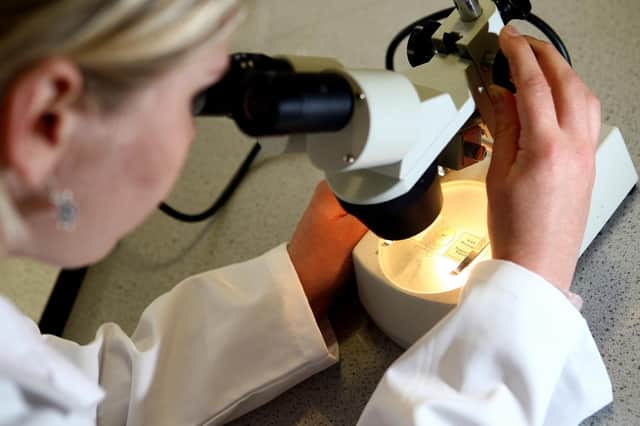Digital health: cancer diagnosis can be made faster with digital screening, ministers say


Ministers approved a recommendation so cancer diagnoses could be made quicker after samples can be viewed digitally on a screen rather than via a microscope.
The Department of Health and Social Care (DHSC) said it is taking forward the recommendation of the UK National Screening Committee to increase the use of digital pathology to examine body tissue samples as part of screening programmes. Officials said the change will boost breast, bowel and cervical cancer screening across the NHS.
Advertisement
Hide AdAdvertisement
Hide AdHealth minister Andrew Stephenson said: “We know the earlier cancer is detected the sooner it can be treated, and the greater the chances of survival and recovery. Cancer is already being diagnosed at an earlier stage, more often and the NHS is seeing and treating record numbers of cancer patients.
“Increased use of digital pathology will help the NHS to go further and faster and provide another weapon in our battle against cancer.”
The shift, announced on Monday, will help speed up diagnosis for patients and make it easier to identify cancers, the DHSC said, and it will also allow clinicians to gain second opinions on whether samples obtained are cancerous and allow laboratories to work more efficiently and quickly, officials said. NHS England is expected to issue guidance to pathology teams on the best way to use the technology.
In 2020, the UK National Screening Committee was asked by the National Co-ordinating Committee for Breast Pathology and the Royal College of Pathologists to consider the evidence regarding the use of whole slide imaging - a technique which allows slides to be reviewed digitally on a computer screen, rather than with a microscope.
Advertisement
Hide AdAdvertisement
Hide AdThe technology enables an image of the entire glass slide to be created in high resolution which can then be stored and viewed on a computer screen or mobile device and saved for later review.
A trial then assessed whether using digital microscopy was as effective as using microscopes and slides for screening samples, with results confirming it was.
Following the trial, the committee – an independent body that advises ministers and the NHS – agreed it was a safe option to complement or replace light microscopy.
Professor Sir Mike Richards, chairman of the UK National Screening Committee, said: “We need a high level of evidence when it comes to screening programmes so, alongside the National Institute for Health and Care Research, we sponsored vital research to assess the effectiveness of this technique.
Advertisement
Hide AdAdvertisement
Hide Ad“Following that research, I’m pleased that the UK National Screening Committee’s recommendation to allow the use of digital pathology has been approved. Its use will support flexibility for pathologists and make sharing samples for second opinions or quality assurance easier and more efficient.”
Comment Guidelines
National World encourages reader discussion on our stories. User feedback, insights and back-and-forth exchanges add a rich layer of context to reporting. Please review our Community Guidelines before commenting.
